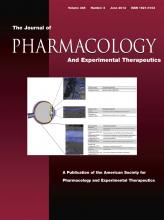Abstract
The monoacylglycerol lipase (MAGL) inhibitor 4-nitrophenyl 4-(dibenzo[d][1,3]dioxol-5-yl(hydroxy)methyl)piperidine-1-carboxylate (JZL184) produces antinociceptive and anti-inflammatory effects. However, repeated administration of high-dose JZL184 (40 mg/kg) causes dependence, antinociceptive tolerance, cross-tolerance to the pharmacological effects of cannabinoid receptor agonists, and cannabinoid receptor type 1 (CB1) downregulation and desensitization. This functional CB1 receptor tolerance poses a hurdle in the development of MAGL inhibitors for therapeutic use. Consequently, the present study tested whether repeated administration of low-dose JZL184 maintains its antinociceptive actions in the chronic constriction injury of the sciatic nerve neuropathic pain model and protective effects in a model of nonsteroidal anti-inflammatory drug–induced gastric hemorrhages. Mice given daily injections of high-dose JZL184 (≥16 mg/kg) for 6 days displayed decreased CB1 receptor density and function in the brain, as assessed in [3H]SR141716A binding and CP55,940 [(−)-cis-3-[2-hydroxy-4-(1,1-dimethylheptyl)phenyl]-trans-4-(3-hydroxypropyl) cyclohexanol]-stimulated guanosine 5′-O-(3-[35S]thio)triphosphate binding assays, respectively. In contrast, normal CB1 receptor expression and function were maintained following repeated administration of low-dose JZL184 (≤8 mg/kg). Likewise, the antinociceptive and gastroprotective effects of high-dose JZL184 underwent tolerance following repeated administration, but these effects were maintained following repeated low-dose JZL184 treatment. Consistent with these observations, repeated high-dose JZL184, but not repeated low-dose JZL184, elicited cross-tolerance to the common pharmacological effects of Δ9-tetrahydrocannabinol. This same pattern of effects was found in a rimonabant [(5-(4-chlorophenyl)-1-(2,4-dichloro-phenyl)-4-methyl-N-(piperidin-1-yl)-1H-pyrazole-3-carboxamide)]-precipitated withdrawal model of cannabinoid dependence. Taken together, these results indicate that prolonged, partial MAGL inhibition maintains potentially beneficial antinociceptive and anti-inflammatory effects, without producing functional CB1 receptor tachyphylaxis/tolerance or cannabinoid dependence.
Footnotes
- Received October 27, 2012.
- Accepted February 12, 2013.
This work was supported by the National Institutes of Health [Grants T32DA007027, P01DA009789, P01DA017259, P50DA005274, R01DA030404, and R01DA015197]; and a Toni Rosenberg Fellowship.
B.F.C. and A.H.L. serve on the advisory board of Abide Therapeutics. A.H.L. also serves as a consultant for Ironwood Pharmaceuticals.
- Copyright © 2013 by The American Society for Pharmacology and Experimental Therapeutics
JPET articles become freely available 12 months after publication, and remain freely available for 5 years.Non-open access articles that fall outside this five year window are available only to institutional subscribers and current ASPET members, or through the article purchase feature at the bottom of the page.
|






